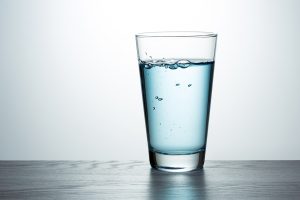If they don’t know what symptoms to look for, it’s very easy for family members to overlook the signs of dehydration in elderly loved ones. Most people think about dehydration as something that only happens on hot days after exercise, but in fact, elderly adults are a high risk of developing dehydration. Once they know what to look for, they can help their aging loved ones avoid dehydration.

How Do Seniors Become Dehydrated?
Family caregivers and elder care providers must be on the lookout for signs of dehydration. These symptoms are a warning that the aging adult’s body is not getting enough liquid to work properly. In fact, dehydration in aging adults is often caused by things like the side effects of certain medicines. Their kidneys don’t work as well, either, causing liquids to exit the body faster.
Seniors also may have a diminished sense of thirst, which doesn’t prompt them to drink as much. If elderly adults are bedridden or are otherwise unable to get their own drinks, they may not ask for water because they don’t want to bother anyone. Finally, some aging adults worry about having too much to drink and triggering toilet accidents, so they refuse to drink enough water.
Symptoms of Dehydration in Elderly Adults.
Family caregivers and elder care providers can certainly spot symptoms of dehydration in seniors if they are paying attention. The most obvious one is dark urine with a strong smell. Infrequent bathroom use may be another clue to dehydration. Family caregivers can also watch for dehydration signs in their aging loved ones when they have a lack of tears and sweat and loose skin that is no longer supple. In cases of severe dehydration, elderly adults can become confused, dizzy, fatigued, and even unconscious.
If family caregivers and elder care providers think that the elderly adult is dehydrated, they can take some action right away. They can give the aging adult sips of water or sports drinks. If the aging adult is demonstrating dizziness or poor balance, they should sit until they feel a little steadier. If the senior is unconscious, they need to call emergency services to assist them.
Keeping seniors hydrated is important for family caregivers and elder care providers. The easiest way to do this is to serve food with high water content. This includes fruits like melon, berries, and citrus. Water-rich vegetables include tomatoes, celery, and cucumbers. Seniors should also drink plenty of water throughout the day, and avoid things like soda, coffee, and tea until their water quota is reached. Many elder care providers always make sure to have a water bottle within reach, so the aging adult can drink frequently throughout the day, especially at meals and snacks.
Dehydration can be a serious problem in aging adults, but it can be completely banished if family caregivers and elder care providers work together to ensure the senior is not ignoring their body’s need for liquid.

